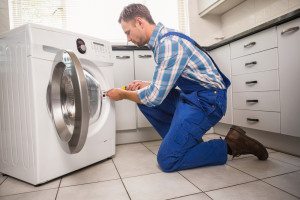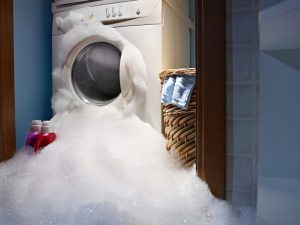If you replace your washing machine hoses on a regular basis, you’ll probably sleep better at night than many people. These innocuous but important little plumbing parts tend to slip most  people’s minds, until something goes wrong with them. And something will eventually go wrong with them. How do you know when the time comes to replace your washing machine hoses? Read on to learn more about these little but mighty hoses, why they fail and how you can avoid a problem in your home.
people’s minds, until something goes wrong with them. And something will eventually go wrong with them. How do you know when the time comes to replace your washing machine hoses? Read on to learn more about these little but mighty hoses, why they fail and how you can avoid a problem in your home.
Why Washing Machine Hoses Fail
Every time the water in your machine stops and starts, it sends a jarring shock wave through the hose that connects your washer to the hot and cold water lines. The majority of connection hoses for this purpose are made, all or in part, from rubber components. As rubber ages, it loses flexibility and will eventually become incapable of maintaining the required level of pressure.
Even when the machine isn’t running, these hoses are constantly under the same pressure as every other faucet and plumbing fixture in your home. Over time, the rubber and polymer hose materials lose resiliency, making them vulnerable to cracks, leaks and bursting. If one of these water hoses bursts when you are away, as much of 650 gallons of water an hour can flood your home, causing a huge mess and potentially devastating damage to your home.
Standard Black Washer Hoses
The most common connectors are constructed of rubber tubing with a polyester liner for reinforcement. Metal inserts at the coupling end attach them to the water supply valve, and this is where most failures will occur. The motion of the washing machine causes the metal edge to rub against the inside of the hose, which cuts it gradually from the inside out. This phenomenon is called razoring. Breakage can occur at any time, but it typically takes 2 to 5 years.
Rubber tube connectors are also vulnerable to stress fractures, especially as the rubber begins to age. Inspect your hoses for cracks or fractures monthly, and immediately replace them if you notice any. Rusting is another common issue with rubber connector hoses. The metal fitting can corrode, and as it does, it becomes jagged and rough. This rough edge can cut partially into the hose, allowing water to leak between the hose and its outer covering, forming a bubble. This is a sign of imminent failure. If you notice bubbling, shut off the water supply and replace both hoses immediately.
Braided Stainless Steel Hoses
These are often proposed as a superior alternative to rubber connectors, but in practice they have been problematic and found to be not much stronger than rubber. During the manufacturing process, braided hoses must be crimped to fasten the fitting to the tube. This crimping can damage the hose and make it weak and vulnerable at the connection.
These hoses can also corrode, which causes the stainless steel braided cover to weaken, fray and even break so that it no longer protects the integrity of the hose. Unfortunately, braided hoses hide their defects better than rubber, so you probably won’t see any signs that failure is coming. Replace these every two years to reduce the possibility of an unpleasant surprise.
One of the most effective ways to avoid a broken washer hose and the subsequent flood risk is to have your washer inspected and maintained on an annual basis. The experts at Complete Appliance Repair in North Salt Lake, Utah, specialize in keeping all of your appliances running safely and efficiently. Contact them today for washer service and maintenance, and to replace your washing machine hoses for true peace of mind.


 seals and drain lines are all susceptible to leaking. Aside from being costly to already expensive washing machines, washer leaks can cause extensive damage to your floors, walls and surrounding appliances as well. Although it’s impossible to predict a washer leak, following these simple tips can help you avoid potential problems.
seals and drain lines are all susceptible to leaking. Aside from being costly to already expensive washing machines, washer leaks can cause extensive damage to your floors, walls and surrounding appliances as well. Although it’s impossible to predict a washer leak, following these simple tips can help you avoid potential problems.